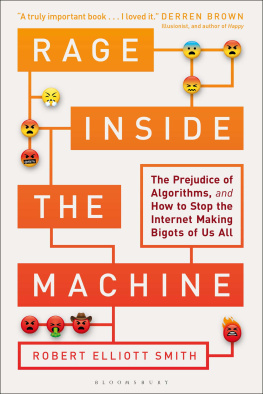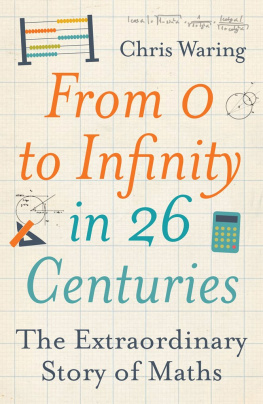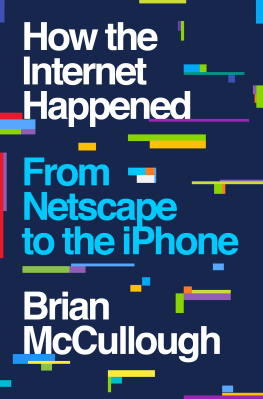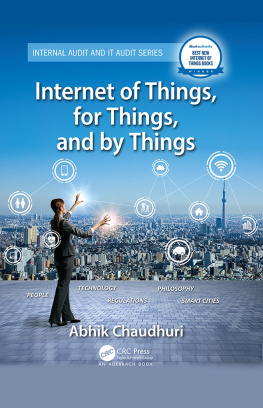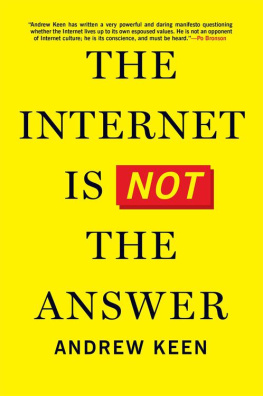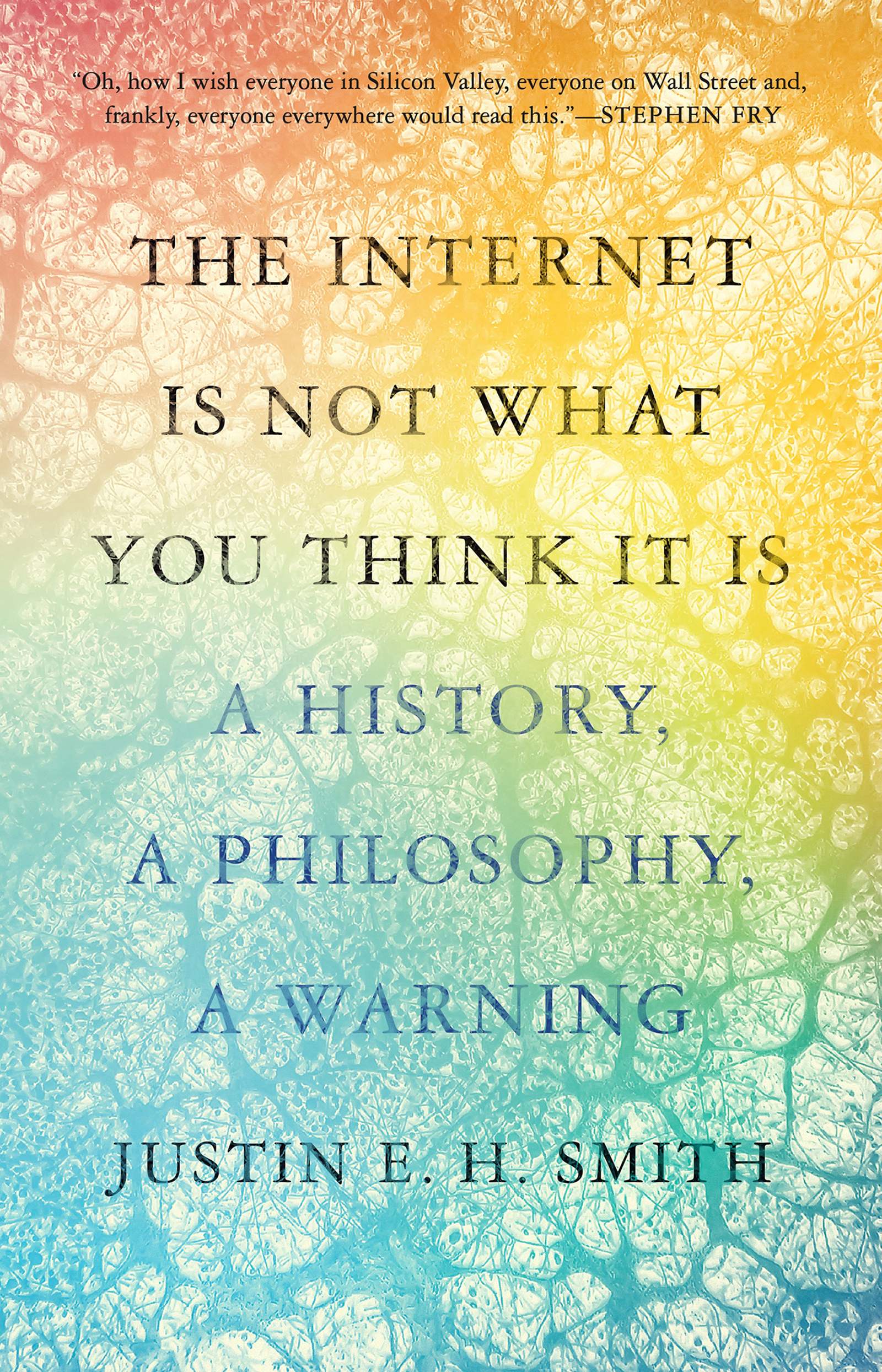THE INTERNET IS NOT WHAT YOU THINK IT IS
The Internet Is Not What You Think It Is
A HISTORY, A PHILOSOPHY, A WARNING
JUSTIN E. H. SMITH
PRINCETON UNIVERSITY PRESS
PRINCETON & OXFORD
Copyright 2022 by Justin E. H. Smith
Princeton University Press is committed to the protection of copyright and the intellectual property our authors entrust to us. Copyright promotes the progress and integrity of knowledge. Thank you for supporting free speech and the global exchange of ideas by purchasing an authorized edition of this book. If you wish to reproduce or distribute any part of it in any form, please obtain permission.
Requests for permission to reproduce material from this work should be sent to
Published by Princeton University Press
41 William Street, Princeton, New Jersey 08540
6 Oxford Street, Woodstock, Oxfordshire OX20 1TR
press.princeton.edu
All Rights Reserved
Library of Congress Control Number 2021950463
ISBN 978-0-691-21232-6
ISBN (e-book) 978-0-691-22968-3
Version 1.0
British Library Cataloging-in-Publication Data is available
Editorial: Rob Tempio and Matt Rohal
Production Editorial: Jill Harris
Jacket Design: Karl Spurzem
Production: Erin Suydam
Publicity: Maria Whelan and Carmen Jimenez
Copyeditor: Karen Verde
Jacket image: Mycelium, Fusarium euwallaceae. Courtesy of Protasov AN / Shutterstock
Now this connexion or adaptation of all created things to each and of each to all, means that each simple substance has relations which express all the others, and, consequently, that it is a perpetual living mirror of the universe.
G. W. LEIBNIZ (1716)
[T]hose who think on the mathematical truth as the instrument through which the weak mind of man can most effectually read his Creators works, will regard with especial interest all that can tend to facilitate the translation of its principles into explicit practical forms.
ADA LOVELACE (1843)
This is the struggle with describing social media: it devours importance.
LAUREN OYLER, FAKE ACCOUNTS (2021)
CONTENTS
- ix
ACKNOWLEDGMENTS
MANY DIFFERENT PEOPLE provided many different kinds of support and insight leading to the completion of this book. I suppose I must first thank the editors at The Point Magazine, for publishing my essay, Its All Over, in January 2019. This essay, the closest thing to a viral hit Ive ever produced, would be the germ from which the present book grew. For their helpful comments on various iterations of this books drafts, I heartily thank Agnes Callard, James Delbourgo, Yves Citton, Michael Friedman, Jonardon Ganeri, Ohad Nachtomy, Jessica Riskin, Becca Rothfeld, Eric Schwitzgebel, and Galen Strawson. I am lucky to work with so many wonderful colleagues and students in the Laboratoire Sphre of the Universit de Paris, whose tremendous gamut of research interests provides me with a steady continuing education and a constant stream of new insights and considerations for my own work; thanks especially to Claude-Olivier Doron, Jean-Baptiste Grodwohl, Vincenzo De Risi, Karine Chemla, and Jean-Jacques Szczeciniarz. I am immensely grateful to the Cullman Center for Scholars and Writers, where I held the John and Constance Birkelund Fellowship in 201920 and where I made tremendous progress on this book, even though, deviously, it was not the book I was invited there to complete (that one is on its way, I promise). I thank, in particular, the director of the Cullman Center, Salvatore Scibona, as well as my fellow fellows, Ken Chen, Hua Hsu, and Sally Rooney, and Eric Sanderson of the Bronx Zoo, for his contributions to my understanding of ecology and of the limits of ecological metaphors for thinking about the internet. I am no less grateful to my collaborators in the 2021 workshop in the history of science at Princeton University on the theme of Attention: History, Science, Philosophy, notably to my co-organizer D. Graham Burnett, and also to Carolyn Dicey Jennings, Jesse Prinz, John Tresch, Natasha Dow Schll, and all the other participants. I extend special thanks to all the brave pioneers who participated in the open and experimental Zoom seminar that I conducted on Kants Critique of the Power of Judgment from March to May 2020, while under quarantine in New York and suffering from COVID-19 and its after-effects (another sort of viral hit). I thank in particular Ognian Kassabov, Jake McNulty, Catherine Wilson, and Johanna Winant for their contributions. That seminar was an absolute lifeline for me, and its impact on my thinking is evident on nearly every pagenot only the ones that discuss Kant. Special thanks also to Augustus Amund Wellner, for sharing my taste in memes. And thanks finally, as always, immeasurably, to Adina Ruiu.
THE INTERNET IS NOT WHAT YOU THINK IT IS
Introduction
Let us calculate!
TO STRENGTHEN our social fabric and bring the world closer together. This, maintains Mark Zuckerberg, CEO of Facebook Corporation, is his enterprises reason for being. Yet it would not take a particularly critical mind to notice that strengthening the social fabric and bringing the world closer together are not, in fact, what Facebook is doing. No, Facebook and the other big tech companies are, plainly, tearing the social fabric to threads, and pulling people apart.
Just fire up your computer and marvel at the news of the day, at all the angry people behind the avatars, fighting with one another and with bots about the news, and about the meaning of the news. Witness how global and local politics have been corrupted into a form of unrelenting disinformation warfare. See organized trolling campaigns fomenting violence against minority groups throughout the world. Observe the mobbing of political dissidents by mass campaigns from below, and the repression of the same dissidents by state surveillance from above. Revisit 2016 and watch the technologies of the new big tech companies mobilize to propel a disreputable internet troll into the highest office of the most powerful country in the world. Tremble before the online rage addicts who daily band together in search of new targets: someone caught on video in a moment of indiscretion, who is then summarily doxxed (that is, has their personal information revealed on the internet), shamed, fired, or ostracized; some young adult on the cusp of success who is brought low when shown to have used hateful language as a teenager in a chat forum; some clueless normie (slang for a normal, mainstream person, oblivious to the rhythms and insiderisms of online culture) ruthlessly ridiculed for not yet having adopted the terminology for a given identity group that was ratified by social-media vanguards only a short time before. There is no sign that anyone has a clear plan, or the necessary power, to abate the chaos these technologies have unleashed. We are living in a crisis moment of history, in the true sense of crisis: things might get better eventually, but they will never be the same.
As recently as ten or fifteen years ago, one could still sincerely hope that the internet might help to bring people together and to strengthen the social fabric. When the revolutions of the so-called Arab Spring began to break out, many of us, myself included, declared that this was the power of social media being unleashed, hailing a new era of democracy and egalitarianism throughout the world.
The arc of such utopian hopes is long, and it has decisively bent in the direction of defeat only in the last decade. The dream of a rationally governed society, freed of passionate human conflicts through the outsourcing of decision-making procedures to machines, is one that the German philosopher Gottfried Wilhelm Leibniz already articulated as early as the 1670s. In a text in which he develops an artificial and formal language for the exact expression of all natural-language terms, the philosopher envisions a near future in which, if controversies were to arise, there would be no more need of disputation between two philosophers than between two calculators. For it would suffice for them to take their pencils in their hands and to sit down at the abacus, and say to each other:



